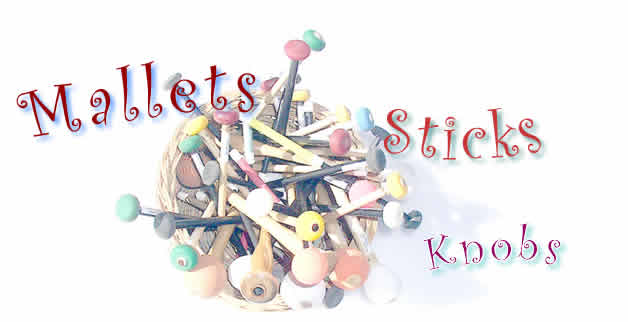
Whatever you call them you need to strike your marimba bars with something

Whatever you call them you
need to strike your marimba bars with something
My experiments with mallets started with the Great Fan Bass Marimba. The ash bars are stiff and require a pretty good whack to get the sound out. Plus, the sweet spot on the lowest bars was a long reach with the usual bass mallets. I needed something long, strong and easy to hang on to, as a loose stick of this weight could be pretty dangerous.
Here are three bass mallets. The top one is made by Stacy
Sabella. The middle one has a lathe turned maple stick with a turned lacrosse
ball on the business end. They are 15.25" long and 2" diameter at
the stopper on the end of the stick. The stopper allows a loose grip and the
use of almost the full length of the mallet. As long as you keep your thumb
wrapped around the stick it won't fly out of your hand. If you try to correct
for a poor aim by steering with your thumb, look out, that's when the stick
will fly. These seemed pretty indestructible, I played them hard for three years.
Then, during one particularity exuberant show -
It was pretty exciting, the show was in a gymnasium. The end of the stick nearly hit the ceiling. Then fortunately it landed safely on the floor.
The new replacement set (at the bottom in the top picture) has a slightly different contour and is 1/2 inch shorter. The big difference is a tubular fiberglass core. Recommended for gluing the lacrosse ball to the stick is either Shoe Goo or Aqua Seal, epoxies or Gorilla Glue or are too brittle for the wood-rubber bond.
Mallets for Soprano - Tenor Marimbas
The standard mallet for Shona style marimba is a 12" length of birch dowel with a rubber striking end. Some people wrap them with heat shrink tubing, plastic dip, or golf club grip tape. They are heavy, they break, the wraps come loose, the butt end can chew up your bars, and occasionally the rubber comes off. If this is the mallet you want I recommend Stacy Sabella's mallets. She does a good job and I've never seen her rubber come off. She offers birch, hickory or oak handles, and leaves any wrapping or end protection up to you, (Stacy's Sticks, 330 Ravens Road, Port Townsend WA 98368).
Here's the mallet I've come up with:
The stick is fiberglass tubing, it's light, and very strong. Never say never; but I can't imagine breaking one of these by playing marimba with it. The material comes in a 54" length which yields four 13.5" pieces. That's a bit longer than the standard. Some people like this extra length, you can always cut them off if you don't. The fiberglass is stiffer and slicker than wood. This can be a problem for some players. The extra stiffness means more energy goes into the bar but also means more shock goes into your arm. I use a 3/8" tube and wrap it with bicycle handlebar tape. The wrap brings the diameter up to the 1/2" that most people are used to. It also provides a secure grip and cushions the shock. Whatever diameter you use the end cap is essential, fiberglass is much harder than wood and an unprotected end will chew up your bars quickly. The rubber is glued on with thin cyanoacrylate glue (so far so good, but check back in a year or so). These mallets are about 30% lighter than the standard wood handled ones (1.3 oz. vs. 1.9 oz.). Lighter mallets are faster and I suspect in the long run easier on your body. However, if you are playing a stiff marimba the lighter mallet may not give you the volume you are used to.
Some Other Mallets
Why are They Called Knobs?
It’s short for knobkerrie. A knobkerrie is a stick with a wood or stone knob at the end. Herd boys in southern Africa would carry them. It was a good defense for snakes and with some practiced throwing one could even provide some dinner.
An alternate spelling is knobkerry. When I first heard the word I assumed it would be knobcarry. The “k” could be an Afrikans influence.
This sculpture is on the campus of the University of Botswana in Gaborone. It commemorates the idea that if every family in Botswana would contribute one cow, a university could be established. They did and it was.
Home * Send
E-Mail * Site Map * Wood
Turning * Alabaster
Turning * Guitars * Shona
Music * Marimbas * Bio
© 2000 Max Krimmel non-commericial
duplication and distribution expected and encouraged
Max Krimmel - 4875 Sioux Dr. apt. 008 - Boulder, CO 80303 - 303-715-8275